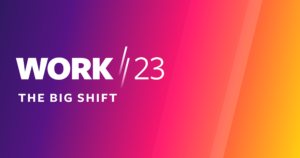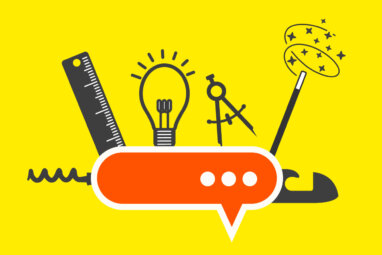Thriving in the New World of Work
A presenter at MIT SMR’s symposium on the future of work answers attendees’ questions about the risks of pessimism, the difference between self-efficacy and self-esteem, and how to build resilience.
Topics
Work/23: The Big Shift

Workforce well-being is an urgent issue: Stress and burnout are limiting employee engagement and driving out talented workers. But Gabriella Rosen Kellerman and Martin Seligman, coauthors of the book Tomorrowmind, have identified five skills that can help individuals flourish in dynamic work environments — even those that are especially pressure-filled.
During Work/23, an MIT Sloan Management Review symposium held in May 2023, Kellerman and Seligman explained that they use the acronym PRISM to refer to those five skills. It starts with prospection — the ability to imagine our options, plan for the future, and restore our agency — which Kellerman described as “the meta skill of our era.” The others are resilience, innovation, social connection, and mattering. All of them can be learned, the coauthors said, and leaders can help their employees do so.
Kellerman and Seligman’s work builds on seminal research Seligman conducted with the U.S. Army to understand which soldiers are most at risk of experiencing post-traumatic stress disorder. He found that people with extreme pessimism — catastrophizers who believe that when bad events occur, everything will fall apart — are most vulnerable. His research also found that soldiers who demonstrate high positive emotion, low negative emotion, and high optimism on Day One are better positioned to withstand their environments and even go on to be awarded medals for heroism.
“I’ve worked on resilience my entire 60 years in psychology,” Seligman said. “The people who were invulnerable, who are resilient, are the optimists.”
Resilience draws on self-awareness and self-compassion, they explained. “Emotional regulation is, in some ways, the foundational skill of maturing as an adult,” noted Kellerman. “It’s our ability to recognize our emotions, to pause in response to them, to reappraise them, and then to choose a response.” That response, she added, ideally comes from a thoughtful, centered place rather than an emotionally reactive one.
Kellerman and Seligman weren’t able to get to all of the questions from attendees during the Work/23 event, so Kellerman answers some of them below. (Questions and answers have been lightly edited for clarity.)





